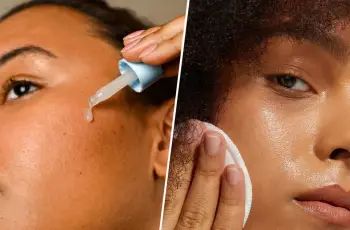
How to Choose a Cleanser That Won’t Strip Your Skin Barrier
Many people have experienced tightness, dryness, or irritation after using a facial cleanser, often due to barrier damage from a harsh or stripping product.
When your skin barrier is compromised by cleansers, it can take weeks or even months to fully recover, especially for those with naturally sensitive or dry skin types.
Using the wrong facial cleanser can weaken your skin’s defenses, causing a cycle of dryness, inflammation, and sensitivity that worsens over time if not addressed properly.
This article will help you understand what causes a cleanser to strip your skin and how to choose one that cleans gently while supporting your skin’s protective barrier.
Cleansers that over-foam or contain harsh surfactants are typically responsible for stripping away too much oil and disrupting the skin’s natural lipid layer.
Even some micellar cleansers, which are marketed as gentle, can dry out the skin if they contain strong surfactants or drying alcohols in their formulas.
When we say a cleanser is “stripping,” we mean it removes essential skin oils (lipids) and weakens the skin’s protective barrier, leaving it dry and more vulnerable to damage.
Natural skin oils like ceramides, fatty acids, and cholesterol help retain moisture and form a defense against pollution, allergens, and irritants.
Harsh cleansers remove these oils, which can lead to that tight, squeaky-clean feeling often mistaken for effective cleansing.
However, not everyone should avoid that tight feeling; some skin types may tolerate it better, while others may need to avoid it entirely to maintain skin health.
Cleansers suited for your skin type help maintain the right balance of oil and hydration without over-drying or irritating the skin.
Here are five gentle, non-stripping cleansers to consider if you have dry, sensitive, or easily irritated skin types:
Zerafite Soothing and Calming Cleanser is a non-foaming option ideal for dry skin that needs extra nourishment and protection during cleansing.
Medature Plantract Gel Cleanser works for both dry and oily skin types, making it a versatile choice for people whose skin changes with the seasons.
VMV Hypoallergenics Creammmy Cleansing Milk is ideal for allergy-prone, reactive skin and avoids over 110 common irritants in skincare formulations.
La Roche-Posay Toleriane Hydrating Gentle Cleanser is an affordable, barrier-friendly cleanser loved for its hydrating formula and non-irritating properties.
Alastin Gentle Cleanser is a luxurious option suitable for normal, slightly oily, or dry skin types and supports the skin barrier with every wash.
If you have oily skin, you’re generally less likely to experience barrier damage, as your natural sebum provides a buffer against dryness.
The main factor that determines whether a cleanser strips your skin is the surfactant it uses, not just whether it foams or not.
Foaming cleansers often contain surfactants that produce lather by breaking down oil, but some are gentler than others depending on the ingredients used.
Sulfate-based foaming cleansers tend to be harsher, while sulfate-free options may still provide lather without compromising the skin barrier.
Non-foaming cleansers are usually better for dry or sensitive skin since they don’t rely on aggressive surfactants to cleanse.
Cream and oil-based cleansers clean the skin while depositing nourishing lipids, which makes them ideal for winter use or for anyone with chronic dryness.
Micellar waters contain small oil molecules that attract dirt and makeup, offering a gentle way to cleanse sensitive skin types without rinsing.
Some micellar products still contain drying surfactants, so it’s important to choose one labeled as gentle or suitable for sensitive skin.
To protect your skin barrier, avoid cleansers containing these known harsh ingredients that can cause dryness or irritation:
Sodium Lauryl Sulfate (SLS) is one of the harshest surfactants and is even used in scientific studies to intentionally damage the skin barrier.
Sodium Laureth Sulfate (SLES) is a milder cousin of SLS, but still potentially drying—avoid it if it’s listed among the first five ingredients.
Cationic surfactants like ammonium lauryl sulfate and cocamidopropyl betaine can also strip away skin lipids and disrupt barrier function.
Denatured alcohol is used for quick-drying but can dehydrate the skin, especially when included in cleansers for oily or acne-prone types.
Physical scrubs with rough particles like walnut shells can cause microtears in the skin and damage the barrier when used too frequently.
Your skin’s needs can change with the seasons, and your cleanser should change along with it to ensure barrier protection year-round.
In colder months, skin produces less oil and loses more moisture, so switching to a cream or oil-based cleanser can prevent winter dryness.
During hot, humid summers, sebum production increases, and a lightweight gel-based cleanser might be better suited to oily skin.
If your skin feels suddenly dry or sensitive, your skin type may have shifted, and it’s a good time to retake your skin type quiz and adjust products accordingly.
People who alternate between dry and oily skin depending on the weather need to switch cleansers seasonally to avoid barrier damage.
Over cleansing is a common skincare mistake that can lead to dryness, irritation, and increased sensitivity, especially with already dry or reactive skin.
Even using a gentle cleanser too frequently can strip skin lipids, so it’s essential to find a balance that supports your barrier function.
Oily skin types should limit foaming cleanser use to once per day and choose a non-stripping secondary cleanser for their other cleansing session.
For acne-prone skin, adding a salicylic acid or benzoyl peroxide cleanser can help, but overuse may cause irritation if your barrier is already compromised.
Dry or rosacea-prone skin may benefit from skipping the morning cleanse entirely, focusing on a gentle, non-foaming cleanser used only at night.
Avoid using multiple exfoliating products daily, as over-exfoliation is a key cause of barrier damage, redness, and skin sensitivity.
Limit your routine to no more than three exfoliating ingredients, like acids, scrubs, or retinoids, to protect your barrier from overuse damage.
In summary, understanding your Baumann Skin Type and how it responds to cleansing is essential to choosing the best product for your skin health.
Stick with gentle, barrier-friendly ingredients and avoid harsh surfactants and overuse of foaming cleansers or exfoliants.
By matching your cleanser to your skin type and adjusting seasonally, you can maintain a healthy, hydrated, and resilient skin barrier all year long.
If you notice signs like tightness, dryness, or stinging after cleansing, it’s time to reevaluate your routine and switch to a gentler formula.
Choosing the right cleanser is one of the most effective ways to prevent long-term barrier damage and keep your skin looking and feeling its best.


